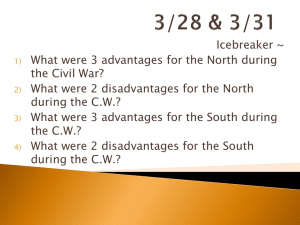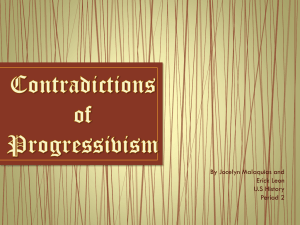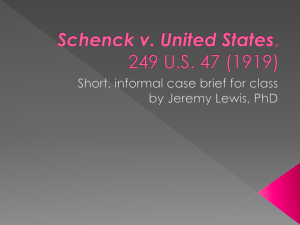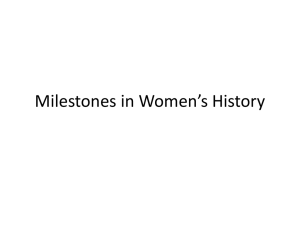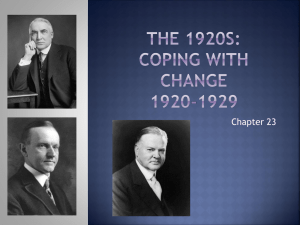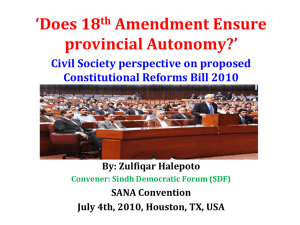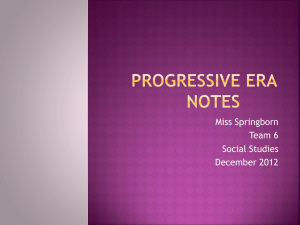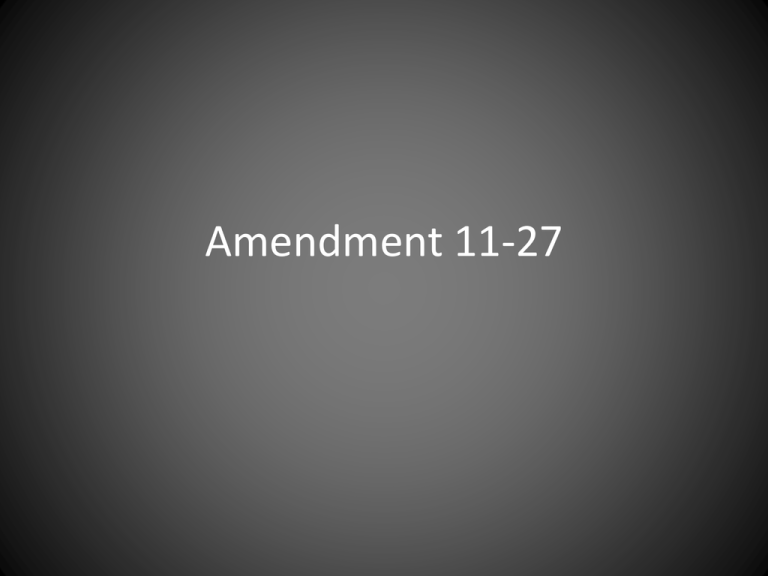
Amendment 11-27
Abolishing Slavery
• The 13th Amendment
– “Neither slave nor involuntary servitude…shall
exist within the US”
• Outlawed slavery in the US
– The Dred Scott Decision
• Supreme Court declared that he was property because
he was a slave
– Amendment was ratified in 1865
• Overturned the Dred Scott decision
Citizenship, Due Process, and Equal
Protection
The
th
14
Amendment(1868)
Citizenship meaning
Due Process
Equal Protection
• “All persons born or
naturalized in the US, and
subject to the jurisdiction
thereof, are citizens of the
US”
• Provides citizenship for
all people born or
naturalized in the US
• “…nor shall any State
deprive any person of life,
liberty, or property,
without due process of
law”
• Prevents states from
denying life, liberty, or
property without due
process
• “…nor deny to any person
within its jurisdiction the
equal protection of the
laws.”
• Ensures all people are
treated equally under
the law
Voting Rights for African American
Men
• The 15th Amendment, 1870
– “The right of citizens in the US to vote shall not be
denied or abridged by the US or by any State on
account of race, color, or previous condition of
servitude.”
• Voting rights for African American Men
– States set rules for voting
• Rules can’t exclude on racial grounds
• Poll taxes and literacy tests
Women’s Suffrage
• The 19th Amendment,1920
– “The right of citizens of the US to vote shall not be
denied or abridged by the US or any State on account
of sex.”
• Gave women rights to vote
• Women’s Suffrage Movement
• Seneca Falls, 1848
– 1st women’s rights convention
• Declaration of Sentiments
– Leaders included many women
Old Enough to Fight, Old Enough to
Vote
• The 26th Amendment, 1970
– “The right of citizens of the US, who are 18 years old
or older, to vote shall not be denied or abridged by
the US or by any State on account of age.”
• Lowered the voting age from 21 to 18
• The Vietnam War
– The military draft
• Extending the Voting Right Act of 1965
– Oregon appealded to the Supreme Court
• An issue of fairness
– Fast Approval
Review
13th
Amendment
15th
Amendment
26th
Amendment
• 1865
• 1870
• 1970
1868
1920
• 14th
Amendment
• 19th
Amendment
Voting Rights in Washington, DC
• The 23rd Amendment
– “The District constituting the seat of Government of
the US shall appoint…a number of electors of
President and Vice President”
• Granted residents in the District of Columbia the right to
vote for president and vice president
– Originally in the Constitution
• Voter eligibility required that residents had to live in states
– The amendment also capped the number of electors
at 3 to match that of the smallest state
Poll Taxes
th
24
Amendment
“The right of citizens of the US to vote…for President or Vice
President…for Senator or Representative in Congress, shall not
be denied or abridged by the US or any State by reason of
failure to pay poll tax or other tax.”
Prohibits the requirement
of poll taxes to vote in
elections
Idea behind the Poll Tax
1. Those who contribute to
society should have a say
in government
The poll tax after the Civil
War
1. Used in the South to
prevent African Americans
from voting
Income Taxes
• The 16th Amendment
– “The Congress shall have power to lay and collect
taxes on income, from whatever source derived”
• Congress can enact a federal income tax
– The Constitution sets limits on how Congress can
levy taxes
– Direct taxes are tied to population
– Expense of war and a growing population
– Government needed more money
Prohibition and Repeal
• The 18th Amendment
– Allowed Congress to outlaw the production, sale, and
transportation of liquor
• Ratified 18th Amendment as a result of the prohibition
movement
– Life during prohibition
• Bootleggers
– Support of the Prohibition movement declined
• Anti-prohibitionists and the election of 1932
• The 21st Amendment
– Repealed the 18th Amendment
Review
The Political System
The 11th Amendment
• Prohibits individuals from one-state from suing another state
• Preserves state’s independence
The 12th Amendment
• Altered processes of how president/vice president were elected
• Changed the Electoral College procedure
17th Amendment
• Allows citizens to vote for senators directly
• Previous selection by state legislatures led to problem
• Not accountable to the people, which led corruption
• Better representation of direct democracy
Lame Ducks and Term Limits
• The 20th Amendment
– “The terms of the President and the Vice President
shall end noon on the 20th of January, & the terms
of the Senators and Representatives at noon on
the 3rd of January.”
• Set January 3rd as opening of congressional session
• Set January 20th as inauguration day for the President
– The Lame Duck Amendment
– Waited for the New Deal
Term Limits for Presidents
• The 22nd Amendment
– “No person shall be elected to the office of the
President more than twice.”
• Set a 2-term limit for the president
– No term limits in the Constitution
• 2-term tradition began by George Washington
– FDR was elected president 4 times
• Great Depression and World War 2
Presidential Succession
• 25th Amendment
– “In case of the removal of the President from office or
his death or resignation, the Vice President shall
become President.”
• Set rules for succession of the president and replacement of
vice president
– Clarifies the roles of the vice President
– If president can’t fulfill duties
• The roles of the vice president and the cabinet
– The order of succession
• Presidential succession Act of 1947
Congressional Pay
• 27th Amendment
– “No law, varying the compensation for the services of
the Senators and Representatives, shall take effect,
until an election of Representatives shall have
intervened.”
• Prevents congressional members from voting for a pay raise
for themselves and then collecting it immediately
• Must wait until after the following election
– Proposed with the Bill of Rights
• Amendment was added to the Constitution as a result of
citizen action
Review
Q and A’s
• What was prohibited by the 18th
Amendment?
• A.
• the production, sale, and transportation of
liquor
• Which amendment defines citizenship,
prevents states from denying due process,
and provides equal protection to all people?
• B.
• 14th Amendment
• During the Vietnam War, what voting rights
were changed by the 26th Amendment?
• A.
• It lowered the voting age from 21 to 18 so
those going to war could vote on the
politicians deciding their future.
• What does the 17th Amendment say?
• D.
• People vote directly for senators.
• Which amendment gave African American
men the right to vote?
C.
• 15th Amendment
Which amendment is credited to Susan B. Anthony and the suffragists?
• A. 19th Amendment ,which gives women the
right to vote
• When the 23rd Amendment was passed, it gave
voting rights to residents of Washington,
DC. Why were they excluded from all of the
previous amendments that gave voting rights?
• B.
• Washington, DC is not a part of a state; the
original Constitution says that only the residents
of states were eligible to vote for president.
• The 13th Amendment overturned the Dred
Scott Supreme Court decision. Which right
did this amendment grant?
• D.
• It abolished slavery in all states.
• How long was it from the time African
American men were given the right to vote
until women were given the right to vote?
• C.
• almost 50 years
• Which US citizens were the last to be given
the right to vote for president and vice
president?
D.
• residents of Washington, DC




